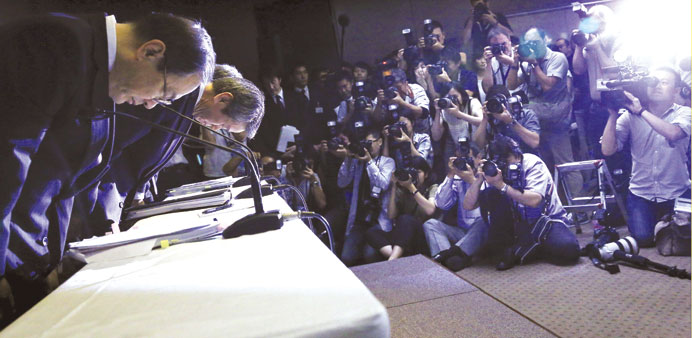Toshiba president and chief executive officer Hisao Tanaka (second left); chairman of the board Masashi Muromachi (left) and corporate executive vice president Keizo Maeda (obscured) bow at the end of news conference at the company headquarters in Tokyo yesterday. The findings after an independent inquiry are expected to lead to the restatement of earnings and potentially hefty fines for Toshiba in Japan’s worst boardroom scandal since Olympus Corp was found to have covered up $1.7bn in losses.
Reuters/Tokyo
Toshiba Corp’s chief executive Hisao Tanaka and a string of other senior officials resigned yesterday for their roles in the country’s biggest accounting scandal in years.
Tanaka will be temporarily replaced by chairman Masashi Muromachi after an independent inquiry found the CEO had been aware the company had inflated its profits by $1.2bn over a period of several years.
“I see this as the most damaging event for our brand in the company’s 140-year history,” Tanaka told a news conference after making a ritual deep bow of contrition to a flurry of camera shutters and flashes. “I don’t think these problems can be overcome overnight.”
Muromachi is considered a safe pair of hands to lead Toshiba through its current turmoil before handing the reins to a successor. The company plans to announce next month the delayed business results for the financial year ended in March.
Tanaka’s predecessors as presidents of the laptops-to-nuclear conglomerate, vice chairman Norio Sasaki and adviser Atsutoshi Nishida, will also step down after the third-party report showed they played a part in the overstatement of profits going back to the 2008 financial year.
A total of eight officials resigned yesterday and Tanaka said that the company is now considering appointing outside directors to over half of its board seats.
Monday’s report by an outside panel of accountants and lawyers said Toshiba had overstated its operating profit by ¥151.8bn ($1.22bn), roughly triple Toshiba’s initial estimate. Tanaka and Sasaki pressured business divisions to meet difficult targets and knew they were overstating profits and delaying the reporting of losses, amid a culture of not going against the wishes of superiors, the report said.
Koichi Ueda, an attorney and head of the panel, said he was surprised by what they had found.
“That a company that represents Japan, to be doing something like this institutionally, was shocking,” he told reporters yesterday.
Tanaka did not dispute the findings, but said he had no intention of encouraging accounting irregularities.
“It’s not my understanding that I gave orders for improper accounting, but the reality is that such an observation has been made,” Tanaka said.
The findings are expected to lead to the restatement of earnings and potentially hefty fines in Japan’s worst boardroom scandal since Olympus Corp was found to have covered up $1.7bn in losses.
Japanese Finance Minister Taro Aso said earlier yesterday that the accounting irregularities at Toshiba were “very regrettable”, coming at a time when Prime Minister Shinzo Abe is trying to regain global investors’ confidence with better corporate governance guidelines.
Aso declined to comment when asked if Toshiba would face any kind of financial penalty. Sources have said regulators were beginning their own review of Toshiba’s book-keeping, based on Monday’s report.
Some analysts have voiced concerns that there could be more issues ahead, including a possible writedown on Toshiba’s Westinghouse nuclear business which was not a major target of the latest probe.
Citibank to pay $700mn over illegal credit card practices
Citigroup Inc’s consumer bank has been ordered to pay $700mn in relief to borrowers for illegal credit card practices, the US Consumer Financial Protection Bureau said.
The consumer finance watchdog said yesterday that about 7mn customer accounts were affected by Citibank’s “deceptive marketing” practices, which included misrepresenting costs and fees and charging customers for services they did not receive.
The CFPB was set up under the 2010 Dodd-Frank Act aimed at reforming Wall Street practices.

